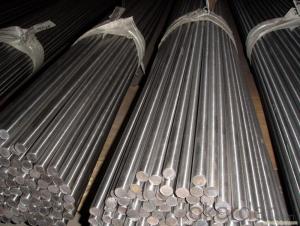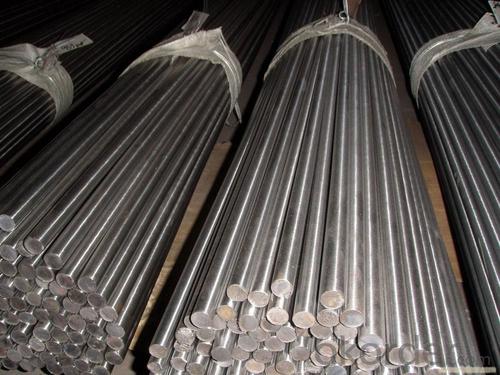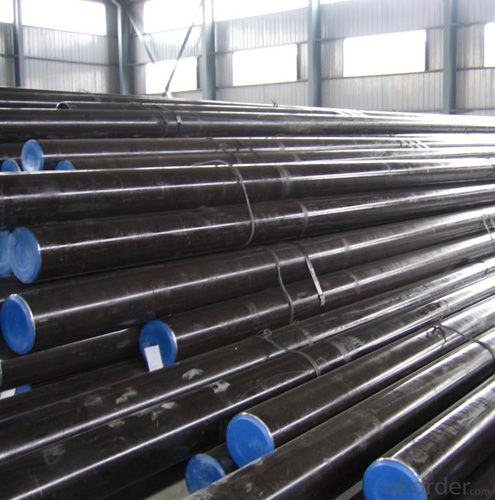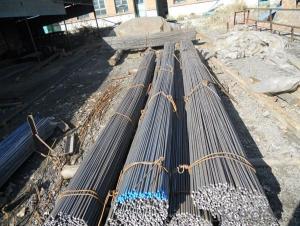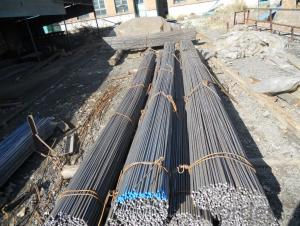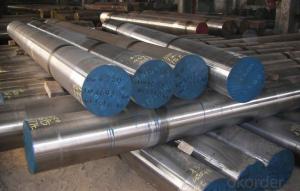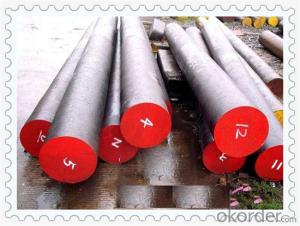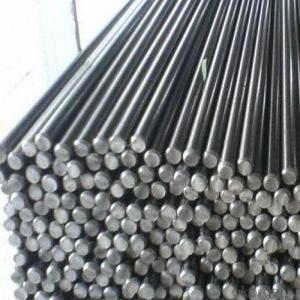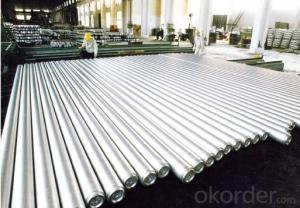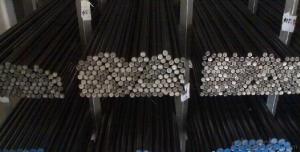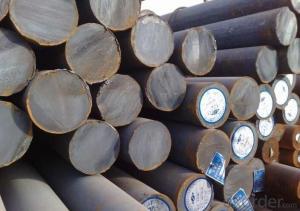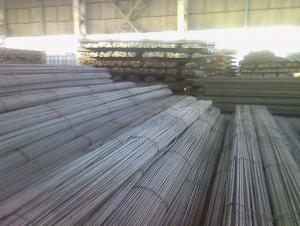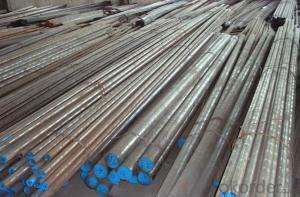Spring Steel 55CrMnA
- Loading Port:
- China Main Port
- Payment Terms:
- TT OR LC
- Min Order Qty:
- -
- Supply Capability:
- -
OKorder Service Pledge
Quality Product, Order Online Tracking, Timely Delivery
OKorder Financial Service
Credit Rating, Credit Services, Credit Purchasing
You Might Also Like
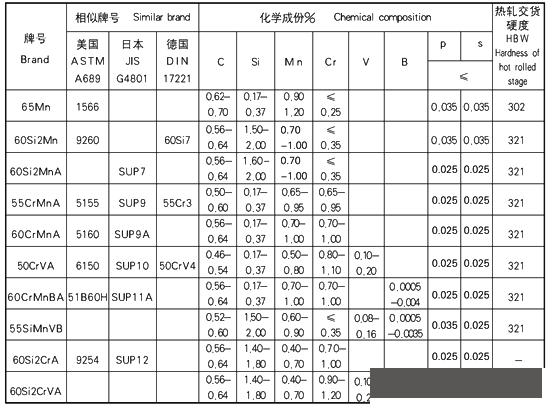
Minimum order Quantity:100tons
Sizes:50--200mm
Application: The spring steel can be used to make the spring which is used in the car, truck,vessel etc.
- Q: How do steel round bars compare to ceramic round bars?
- Steel round bars are generally stronger and more durable compared to ceramic round bars. Steel has a higher tensile strength and can withstand higher temperatures, making it suitable for heavy-duty applications. On the other hand, ceramic round bars are generally lighter, offer better corrosion resistance, and have higher electrical insulation properties. The choice between steel and ceramic round bars depends on the specific application requirements and desired properties.
- Q: How to determine the welding seam height of steel plate and steel bar?
- If the arc surface in the length direction of the steel bar is lapped welded with the steel plate surface, the gap between the steel plate and the round bar is welded by the 2 side welding angle, so that the welded meat is equal to the largest diameter of the round steel arc surface.
- Q: Can steel round bars be used for shafting applications?
- Indeed, shafting applications can make use of steel round bars. In industries like automotive, construction, and manufacturing, steel round bars are frequently employed as material for shafting. These bars possess impressive mechanical properties, durability, and high strength, enabling them to effectively transmit power and rotational motion in machines and equipment. Furthermore, steel round bars can be machined to precise dimensions, subjected to heat treatment for enhanced hardness, and coated to provide protection against corrosion. Moreover, they are obtainable in a variety of grades and alloys, catering to specific application requirements. In summary, due to their inherent strength and versatility, steel round bars are a dependable choice for shafting applications.
- Q: Is round steel bar round steel?
- NoRound steel bars refer to hot rolled round steel bars for reinforced concrete. Round bars include high-quality carbon structural steel, round steel, ordinary carbon structural steel round bars, steel bars for prestressed concrete, etc.. Although the shape is round, but the material is different, so steel and round bar is two yards.
- Q: What are the different methods of cutting steel round bars?
- Cutting steel round bars can be achieved through several methods, each with their own advantages and limitations. Among the commonly utilized techniques are: 1. Abrasive cutting: By utilizing a rotating abrasive wheel, the steel round bar can be ground down. Despite its speed and efficiency, this method often results in a rough cut surface and generates significant heat. 2. Bandsaw cutting: Steel round bars can be sliced using bandsaw machines, which feature a continuous band of toothed metal rotating around two wheels. Although bandsaws provide precise and smooth cuts, they tend to be slower compared to alternative methods. 3. Cold saw cutting: Cold saws are designed specifically for cutting metal, including steel round bars. These saws employ circular blades with teeth that are specially crafted to withstand the hardness of steel. While cold saws guarantee clean and accurate cuts, they generally operate at a slower pace than abrasive or bandsaw cutting. 4. Plasma cutting: Ideal for thicker steel round bars, plasma cutting involves using a focused jet of ionized gas to melt and remove the metal. This method yields precise and clean cuts, but necessitates specialized equipment and can be more costly than other techniques. 5. Laser cutting: Laser cutting employs a high-powered laser beam to melt and vaporize the metal, resulting in precise and clean cuts. This versatile method can be utilized for steel round bars of varying thicknesses, but it does require expensive equipment and may not be suitable for all applications. Ultimately, the chosen cutting method relies on several factors, including the thickness and hardness of the steel round bar, the desired cut quality, the availability of equipment, and the specific project requirements.
- Q: What are the different types of steel round bar surface finishes for corrosion resistance?
- There are several different types of steel round bar surface finishes that are commonly used for corrosion resistance. These finishes provide a protective coating on the surface of the bar, preventing contact with corrosive elements and reducing the risk of rusting or degradation over time. One of the most popular finishes for corrosion resistance is hot-dip galvanizing. This involves immersing the steel round bar in a bath of molten zinc, which forms a layer of zinc coating on the surface. The zinc acts as a sacrificial anode, corroding before the steel does, and providing long-lasting protection against rust and corrosion. Another common surface finish for corrosion resistance is stainless steel. This type of steel contains a minimum of 10.5% chromium, which forms a passive oxide layer on the surface when exposed to oxygen. This layer acts as a barrier, preventing further oxidation and corrosion, making stainless steel round bars highly resistant to rust and other forms of corrosion. Electroplating is another method used to provide corrosion resistance to steel round bars. This process involves immersing the bar in an electrolyte solution and passing an electric current through it. This causes a layer of metal, such as zinc or nickel, to be deposited onto the surface of the bar, providing a protective coating. Powder coating is a popular choice for steel round bars that require both corrosion resistance and aesthetic appeal. This process involves applying a dry powder coating to the surface of the bar and then curing it under heat. The powder melts and forms a hard, durable finish that provides excellent corrosion resistance while also offering a wide range of color options. Additionally, there are specialized coatings available for specific applications, such as epoxy coatings or polymer coatings. These coatings are designed to provide superior resistance to certain corrosive environments, such as exposure to chemicals or high humidity. In summary, the different types of steel round bar surface finishes for corrosion resistance include hot-dip galvanizing, stainless steel, electroplating, powder coating, and specialized coatings. Each of these finishes offers varying levels of protection against rust and corrosion, and the choice of finish depends on factors such as the specific application, environmental conditions, and desired aesthetics.
- Q: What are the advantages of using boron-alloy steel round bars?
- There are several advantages of using boron-alloy steel round bars in various applications. Firstly, boron-alloy steel has significantly higher strength compared to traditional carbon steel. This increased strength allows for the construction of more lightweight and durable structures, reducing material costs and improving overall efficiency. Additionally, boron-alloy steel round bars exhibit excellent hardenability, which means they can be heat-treated to achieve desired properties such as increased hardness and wear resistance. This makes them ideal for use in demanding applications where high strength and durability are required, such as in the automotive and construction industries. Another advantage of boron-alloy steel round bars is their enhanced weldability. They can be easily welded without sacrificing their mechanical properties, allowing for seamless integration into various fabrication processes. This not only saves time and effort during assembly but also ensures the structural integrity of the final product. Furthermore, boron-alloy steel round bars offer excellent resistance to abrasion and corrosion, making them suitable for use in harsh environments or applications where exposure to chemicals or moisture is common. This extends the lifespan of the material and reduces the need for frequent repairs or replacements, resulting in cost savings and improved productivity. Lastly, boron-alloy steel round bars are readily available and cost-effective compared to other high-strength steel alternatives. Their wide availability makes them a viable option for a range of applications, from manufacturing machinery to constructing infrastructure. In summary, the advantages of using boron-alloy steel round bars include higher strength and durability, improved hardenability, enhanced weldability, resistance to abrasion and corrosion, and cost-effectiveness. These benefits make them an excellent choice for various industries where lightweight, strong, and long-lasting materials are required.
- Q: Can steel round bars be used in the textile industry?
- Steel round bars can indeed be used in the textile industry, albeit in limited applications. While textiles are primarily made from natural or synthetic fibers, steel round bars can be utilized in the machinery and equipment used in textile production. These bars are often used to construct frames, supports, and other structural components of textile machinery. For example, steel round bars can be used to build the frames of looms, which are used to weave fabrics. They can also be used in the construction of spinning machines, knitting machines, and other textile manufacturing equipment. Additionally, steel round bars can be used as a base or support for textile drying racks, storage systems, or conveyor systems. In these applications, the strength and durability of steel make it a suitable material for withstanding the demands of industrial textile production. However, it is important to note that steel round bars are not directly incorporated into the fabric or textile products themselves.
- Q: What are the advantages of using chromium-alloy steel round bars?
- There are several advantages to using chromium-alloy steel round bars. Firstly, chromium-alloy steel round bars have excellent corrosion resistance properties. The addition of chromium to the steel increases its ability to withstand corrosion and oxidation, making it suitable for use in harsh environments or applications where exposure to moisture or chemicals is a concern. This corrosion resistance helps to prolong the lifespan of the round bars, reducing maintenance and replacement costs. Secondly, chromium-alloy steel round bars offer high strength and durability. The alloying of chromium with steel enhances its mechanical properties, such as tensile strength, hardness, and toughness. This makes chromium-alloy steel round bars ideal for applications that require high strength and resistance to wear and tear, such as construction, heavy machinery, and automotive industries. Another advantage of using chromium-alloy steel round bars is their heat resistance. The addition of chromium improves the heat resistance of the steel, allowing it to maintain its strength and structural integrity even at elevated temperatures. This makes it suitable for use in high-temperature applications, such as furnace components, boilers, and heat exchangers. Furthermore, chromium-alloy steel round bars are known for their excellent machinability. The alloying elements in the steel enhance its ability to be easily machined, allowing for precise shaping and finishing. This makes it easier and more cost-effective to manufacture complex components or parts using chromium-alloy steel round bars. Lastly, chromium-alloy steel round bars are readily available in the market. Due to their popularity and wide range of applications, chromium-alloy steel round bars can be easily sourced from various suppliers. This availability ensures a consistent supply of the material, reducing production downtime and lead times. Overall, the advantages of using chromium-alloy steel round bars include corrosion resistance, high strength and durability, heat resistance, excellent machinability, and availability. These properties make chromium-alloy steel round bars a versatile and reliable choice for a wide range of applications in various industries.
- Q: What are the different types of steel round bar alloys used in aerospace applications?
- There are several different types of steel round bar alloys that are commonly used in aerospace applications. These alloys are selected for their specific properties and characteristics that make them suitable for use in aircraft and spacecraft components. Some of the most commonly used alloys include: 1. 4130: This alloy is a low-alloy steel that contains chromium and molybdenum. It has excellent strength and toughness, making it suitable for use in applications such as landing gear components and structural tubing. 2. 4340: This alloy is a nickel-chromium-molybdenum steel that is known for its high strength and good ductility. It is commonly used in applications such as gears, shafts, and structural components that require high strength and toughness. 3. 17-4 PH: This alloy is a precipitation-hardening stainless steel that offers a combination of high strength, corrosion resistance, and good toughness. It is often used in aerospace applications where both strength and corrosion resistance are important, such as in turbine blades and structural components. 4. 15-5 PH: This alloy is another precipitation-hardening stainless steel that offers high strength and good corrosion resistance. It is commonly used in aerospace applications such as landing gear components and structural parts. 5. 9310: This alloy is a low-alloy steel that is known for its high hardenability and toughness. It is often used in aerospace applications where high strength and good impact resistance are required, such as in gears and shafts. These are just a few examples of the different types of steel round bar alloys used in aerospace applications. Each alloy offers specific properties and characteristics that make it suitable for different components and requirements in the aerospace industry.
Send your message to us
Spring Steel 55CrMnA
- Loading Port:
- China Main Port
- Payment Terms:
- TT OR LC
- Min Order Qty:
- -
- Supply Capability:
- -
OKorder Service Pledge
Quality Product, Order Online Tracking, Timely Delivery
OKorder Financial Service
Credit Rating, Credit Services, Credit Purchasing
Similar products
Hot products
Hot Searches
Related keywords
